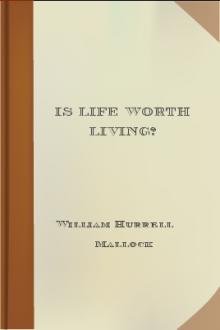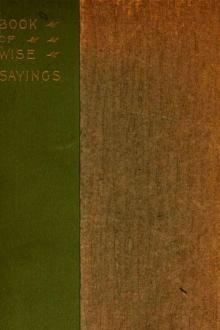Is Life Worth Living?, William Hurrell Mallock [if you give a mouse a cookie read aloud txt] 📗

- Author: William Hurrell Mallock
- Performer: -
Book online «Is Life Worth Living?, William Hurrell Mallock [if you give a mouse a cookie read aloud txt] 📗». Author William Hurrell Mallock
In this exceedingly striking passage we have the whole case before us. The belief on which modern love rests, and which makes it so single and so sacred is, as it were, drawn for us on an enlarged scale: and we see that it is a belief to which positivism has no right. The belief, indeed, is by no means a modern thing. Rudiments of it on the contrary are as old as man himself, and may represent a something that inheres in his very nature. But none the more for this will it be of any service to the positivist; for this something can only be of power or value if the prophecy it inevitably developes into be regarded as a true one. In the consciousness of the ancient world it lay undeciphered like the dark sentence of an oracle; and though it might be revered by some, it could not be denied by any. But its meaning is now translated for us, and there is a new factor in the case. We now can deny it; and if we do, its whole power is paralysed.
This when once recognised must be evident enough. But a curious confusion of thought has prevented the positive school from seeing it. They have imagined that what religion adds to love is the hope of prolongation only, not of development also; and thus we find Professor Huxley curtly dismissing the question by saying that the quality of such a pleasure 'is obviously in no way affected by the abbreviation or prolongation of our conscious life.' How utterly this is beside the point may be shown instantly by a very simple example. A painter, we will say, inspired with some great conception, sets to work at a picture, and finds a week of the intensest happiness in preparing his canvas and laying his first colours. Now the happiness of that week is, of course, a fact for him. It would not have been greater had it lasted a whole fortnight; and it would not have been less had he died at the week's end. But though obviously, as Professor Huxley says, it in no way depends on its prolongation, what it does depend on is the belief that it will be prolonged, and that in being prolonged it will change its character. It depends on the belief on the painter's part that he will be able to continue his painting, and that as he continues it, his picture will advance to completion. The positivists have confused the true saying that the pleasure of painting one picture does not depend on the fact that we shall paint many, with the false saying that the pleasure of beginning that one does not depend on the belief that we shall finish it. On this last belief it is plain that the pleasure does depend, largely if not entirely; and it is precisely this last belief that positivism takes away.
To return again, then, to the subject of human love—we are now in a position to see that, as offered us at present by the positive school of moralists, it cannot, properly speaking, be called a positive pleasure at all, but that, it is still essentially a religious one; and that when the religious element is eradicated, its entire character will change. It may be, of course, contended that the religious element is ineradicable: but this is simply either to call positivism an impossibility, or religion an incurable disease. Here, however, we are touching on a side issue, which I shall by and by return to, but which is at present beside the point. My aim now is not to argue either that positivism can or cannot be accepted by humanity, but to show what, if accepted, it will have to offer us. I wish to point out the error, for instance, of such writers as George Eliot, who, whilst denying the existence of any sun-god in the heavens, are yet perpetually adoring the sunlight on the earth; who profess to extinguish all fire on principle, and then offer us boiling water to supply its place; or who, sending love to us as a mere Cassandra, continue to quote as Scripture the prophecies they have just discredited.
Thus far what we have seen is this. Love as a positive pleasure, if it be ever reduced to such, will be a very different thing from what our positivist moralists at present see it to be. It will perform none of those functions for which they now look to it. It will no longer supply them, as now, with any special pinnacle on which human life may raise itself. The one type of it that is at present on an eminence will sink to the same level as the others. All these will be offered to us indiscriminately, and our choice between them will have no moral value. None of the ethical epithets by which these varieties are at present so sharply distinguished from each other will have any virtue left in them. Morality in this connection will be a word without a meaning.
I have as yet dealt only with one of those resources, which have been supposed to impart to life a positive general value. This one, however, has been the most important and the most comprehensive of all; and its case will explain that of the others, and perhaps, with but few exceptions, include them. One or two of these others I shall by and by treat separately; but we will first enquire into the results on life of the change we have been considering already.
[15] Mr. A. C. Swinburne.
[16] Mademoiselle de Maupin, pp. 213-222. Ed. Paris. 1875.
[17] Mademoiselle de Maupin, p. 223.
[18] Ibid., p. 225.
[19] Mademoiselle de Maupin, p. 222.
[20] Ibid., p. 211.
[21] Dante Gabriel Rosetti.
[22] Aug. Conf., lib. ix. In the earlier part of the passage the extreme redundancy of the original has been curtailed somewhat. In the rendering here given I have to a great extent followed Dr. Pusey.
CHAPTER VI. LIFE AS ITS OWN REWARD.What we have now before us is a certain subtraction sum. We have to take from life one of its strongest present elements; and see as well as we can what will then be the remainder. An exact answer we shall, of course, not expect; but we can arrive at an approximate one without much difficulty.
What we have to subtract has been shown in the previous chapter; but it may again be described briefly in the following way. Life in its present state, as we have just seen, is a union of two sets of feelings, and of two kinds of happiness, and is partly the sum of the two, and partly a compromise between them. Its resources, by one classification, are separable into two groups, according as in themselves they chance to repel or please us; and the most obvious measure of happiness would seem to be nothing more than our gain of what is thus pleasant, and our shirking of what is thus painful. But if we examine life as it actually exists about us, we shall see that this classification has been traversed by another. Many things naturally repellent have received a supernatural blessing; many things naturally pleasant have received a supernatural curse; and thus our highest happiness is often composed of pain, and our profoundest misery is nearly always based on pleasure. Accordingly, whereas happiness naturally would seem the test of right, right has come supernaturally to be the test of happiness. And so completely is this notion engrained in the world's consciousness, that in all our deeper views of life, no matter whether we be saints or sinners, right and wrong are the things that first appeal to us, not happiness and misery. A certain supernatural moral judgment, in fact, has become a primary faculty with us, and it mixes with every estimate we form of the world around us.
It is this faculty that positivism, if accepted fully, must either destroy or paralyse; it is this, therefore, that in imagination we must now try to eliminate. To do this—to see what will be left in life to us, without this faculty, we must first see in general, how much is at present dependent on it.
This might at first sight seem a hard task to perform; the interests we shall have to deal with are so many and so various. But the difficulty may be eluded. I have already gone to literature for examples of special feelings on the part of individuals, and under certain circumstances. We will now go to it for a kindred, though not for the same assistance; and for this end we shall approach it in a slightly different way. What we did before was this. We took certain works of literary art, and selecting, as it were, one or two special patches of colour, we analysed the composition of these. What we shall now do will be to take the pictures as organic wholes, with a view to analysing the effect of them as pictures—the harmony or the contrast of their colours, and the massing of their lights and shadows. If we reflect for a moment what art is—literary and poetical art in particular—we shall at once see how, examined in this way, it will be of use to us. In the first place, then, what is art? and what is the reason that it pleases us? It is a reflection, a reproduction of the pleasures of life, and is altogether relative to these, and dependent on them. We should, for instance, take no interest in portraits unless we took some interest in the human face. We should take none in statues if we took none in the human form. We must know something of love as a feeling, or we should never care for love-songs. Art may send us back to these with intenser appreciation of them, but we must bring to art from life the appreciation we want intensified. Art is a factor in common human happiness, because by its means common men are made partakers in the vision of uncommon men.
Great art is a speculum reflecting life as the keenest eyes have seen it. All its forms and imagery are of value only as this. Taken by themselves, 'the best in this kind are but shadows.' We have to 'piece out their imperfections, with our thoughts;' 'imagination has to amend them,' and 'it must be our imagination, not theirs.'23 In examining a work of art, then,





Comments (0)